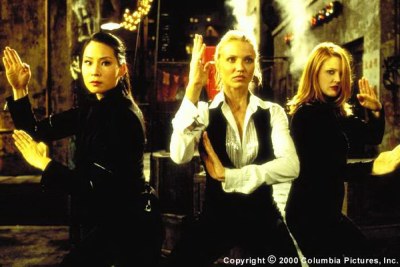cameron diaz movies
|
|
 Chapter 7 - Eating Bitterness on Action Scenes
With the Angel trio complete, the three actresses went head-on into training. Though Liu was a couple of weeks behind, with the support of Diaz, Barrymore, Yuen and the martial arts team, it wasn't long before everyone was in sync.
"In the beginning, we trained six to eight hours a day," recalls Barrymore. "We were down on our knees in a horse-stance learning to balance our body weight. Then we'd do warm-ups and kicks and punches, and then flips. Then we did more kicks and punches. We punched this bag hour after hour. You sweat. You bond. You learn things that you never thought you could do. By the end of the day, your hands are covered with broken blood vessels." Still, she says, "It was so hot!"
"It was a common thing for all of us to be suspended from wires half the day," explains Diaz of the supplementary apparatus used by the trainers. "The great thing about movies," exclaims Diaz, "is you get the opportunity to do things that you never would have been able to do in any other circumstance. And you get to learn these things from the best people."
"Understanding your body and how far you can push yourself was an incredible journey," explains Liu. "If your body isn't used to it," she says, "you find yourself in a situation where you are in a lot of pain."
But, Liu adds, "It was amazing to see the transformation. Not only in myself, but also in Drew and Cameron. We were all suddenly doing things we'd been trying to do for months. It was an incredibly rewarding experience."
"I empathize with what's called 'eating bitterness,'" says the Master. "That means going through the pain just to be tough, to be strong. They were willing to eat bitterness," he says of the Angels. "They trained their flexibility and mastered some basic moves. Then we increased the degree of difficulty. They learned fast."
"What they were doing," explains Diaz of the martial artists, "was conditioning us so that we would be physically able to do whatever they choreographed. The different punches and kicks were all part of our repertoire, so to speak. On the shooting day, they would say 'this is the combination,' and we would pull from our repertoire of knowledge to fit the choreography."
Adds Liu, "The more takes you do, the less likely you can physically achieve what they want. So you have to figure things out during training and apply them when you're actually shooting."
"When we were on set shooting scenes with a lot of action, and it was painful," adds Liu lightheartedly, "we'd just turn to someone on the crew and say, 'It's really hard being an action hero.'"
Says Andy Armstrong, who assisted stunt coordinator Vic Armstrong: "Once you step into the world of action movies, there are two sides to it-a great high when you get things right and a natural frustration when you keep getting it wrong. Women tend to be the most competitive because they have to prove things in two ways: to themselves, and to men."
This philosophy, however, often leads to success. "Women often do very well with this approach because they come to the training with a better attitude than men," adds Vic Armstrong. "Guys come to the table believing they're tough. Women come to the table wanting to learn, and that is a better place to start from."
"There was a healthy competitiveness," says Yuen of Diaz, Barrymore and Liu. "Competition," he says, "is actually a training method. If three or four people are training at the same time, they can become jealous of each other. It's utilizing one's own weakness to make them stronger."
Unlike the scores of 'James Bond' films that Yuen had worked on previously, which placed the focus of the action mainly on gadgets and explosions, Charlie's Angels derives its thrills from the acrobatic combinations of stretches, splits, high jumps and long kicks its stars perform. "The Angels are more about hand-to-hand, one-on-one combat-or three-on-one depending on the opponent," points out Yuen.
Though delighted by the Angels' enthusiasm, stunt coordinator Vic Armstrong and Andy Armstrong often found it nearly impossible to try to talk their zealous stars out of doing their own stunts on some occasions. "Cameron, Drew and Lucy pushed themselves to be at least as good as one another-so much so that the stunt women had to work harder to be better than them."
"I remember watching my sister on the other side of the kindergarten fence-jumping in and out of the sandbox playing 'Charlie's Angels,'" says Diaz. "I couldn't wait to be an Angel. By the time I made it over to the sandbox though, there was no room for me. They already had three Angels." Adds Diaz, "Now that I get to be an Angel, there wasn't any challenge that I was going to back away from."
Says Juvonen, "The girls didn't want the stunt doubles to do it. Once you have invested that much time to get your body in shape, put yourself through the wringer to learn the skills, psyched yourself up for the fights through the struggle of tears and fighting and yelling… you want it to be you."
"I think the discipline of it was really important," concludes Barrymore. "I love being a woman, and I love femininity. But I also love the tough, survivalist aspect of what boys get to do. I just felt so tough and strong. It was thrilling."
While both Goldberg and Juvonen recall that when they first met the Master, he said, "We do not give praise; we commend in other ways," Yuen acknowledges, "The three girls accepted a lot of things and gained confidence through training. They learned Chinese martial arts. I am very pleased with their performance."reatens to occur when good technology falls into the hands of bad people
|